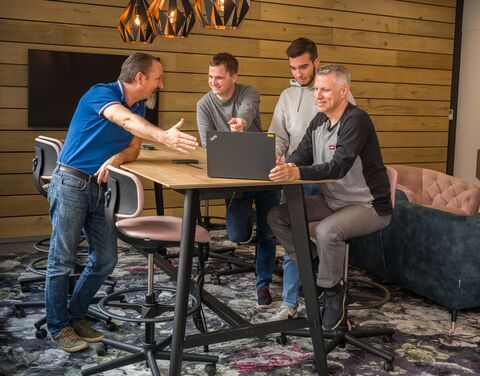
Some of the younger engineers in the team weren’t even born yet when Marc Steiner started working at AXA. Data solutions, application development and Cloud technologies – this is Marc’s world. We talked to the 54-year-old DevOps Engineer to learn a bit about his job and what he likes most about it.
Marc, 1996 to 2023 is a long time. Why are you still at AXA?
Yeah. Who’d have thought back in 1996 that I’d still be here today? Not me! But I’ve always been given the opportunity to learn new things that interested me. As an IT Engineer at AXA Insurance Ltd, I’ve worked for a lot of different business areas and teams over the years. This has allowed me to grow professionally, technically and personally, so I’ve never gotten bored. One defining experience was when I spent 6 months in Barcelona at AXA Spain for an internship. Internal mobility is something we don’t just talk about, we live it – and for me this is a great plus point.
A lot of young developers find a start-up much more exciting than a large company.
I disagree. Our company offers top-notch development and advancement opportunities. But anyone who prefers the start-up atmosphere should apply to AXA Mobility Services or noimos. Both of these are autonomous subsidiaries of AXA Insurance Ltd, but their employees enjoy the attractive employment conditions of a major company.
“A company like AXA offers top-notch development opportunities.”
For the Techies among us: Could you name a few examples of the things you work with?
Sure. Databases such as DB2 and SQLServer as well as newer NoSQL databases like MongoDB. Various development methods, from the traditional waterfall method in project teams to agile methods such as Kanban or Scrum in product teams. Cloud technologies such as Openshift by Red Hat.
DevOps stands for Development and IT Operations. So, as the name suggests, DevOps Engineers mainly work in the areas of development and IT operations. In line with the DevOps principle, work processes along the entire life cycle of a software product are optimized by having the two areas work side by side.
So the work of a DevOps engineer combines software development with administration. The engineers know how to program software, put it into operation and monitor it. Together with developers and administrators, they manage a software product throughout its entire life cycle so any necessary optimizations can be made right away.
The work is very challenging because a DevOps engineer is also responsible for working within the agreed requirements, quality, resources and costs.
What working conditions have really let you thrive as a developer?
Without a doubt it’s the freedom I have. When you’re given a lot of leeway, this boosts your creativity and motivation. Today we work in agile product teams; the rigid technology stacks of old are long gone. Of course there are still some basic parameters we have to work within, but we decide on our own what to implement and how. Compared to the past, everything now is much more open. If there is a promising feature in a new version of the application server, we don’t waste much time discussing it. If it makes more sense to use a NoSQL database instead of a traditional SQL database, then as long as the Product team agrees, it’s not a problem. If we want to convert the CI/CD pipeline (Continuous Integration/Continuous Delivery) from Jenkins to a more Cloud-native one such as Tekton, we can do this immediately. This is what makes a job fun!
“ The rigid technology stacks of old are long gone.”
Tell us about a typical day on the job. Where and when do you work?
Every team member decides for themselves how they want to work – this is the way we’re most productive. We call this flexible work model Smart Working. Thursday is our Team Day because this is when most people come to the office and have lunch together. But even then, it’s not a fixed requirement. If I have a refactoring coming up, which requires a great deal of concentration, my home office is the right place to do this. But if I’m working on a new business feature, say, and I need to learn more about it, then I’d rather go to the office because I can just ask the person sitting across the desk for help. Meetings are almost always held using Microsoft Teams. We choose a time that works for everyone, even those who aren’t morning people. Being able to organize my day the way I want to gives me real quality of life. If I’m going to install a new release in the evening, for example, then I just take a longer break during the afternoon. I like to go for a bike ride or take a walk in the sunshine to recharge.
“Being able to organize my day the way I want to gives me real quality of life.”
Does your team really feel like one since the members rarely see one another in person?
Interestingly enough, I feel our team spirit is even stronger than before. We’re all pulling in the same direction. Although we usually meet virtually nowadays, I feel well integrated and informed. We just have a really good atmosphere.
One last question: What mindset does a developer at AXA need?
You can’t be bothered by the little things or the interruptions that are always popping up, and which can sometimes be persistent. And you need team spirit and a laid-back mindset for those times when no one agrees with your ideas. But the most important qualities are being open to change and having the courage to try something new. Even when the status quo is humming along just fine.